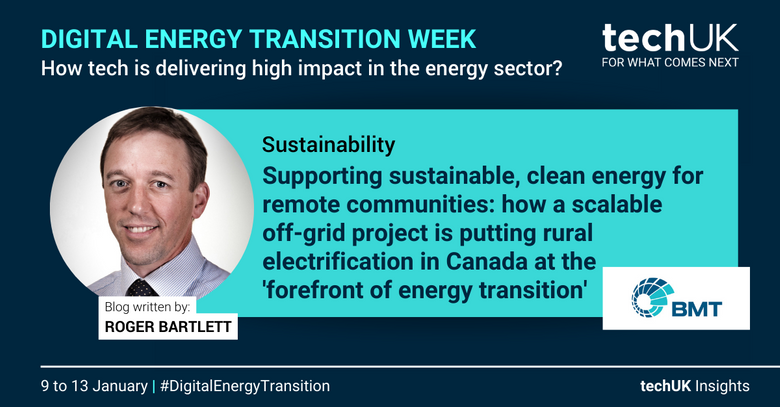Supporting sustainable, clean energy for remote communities: how a scalable off-grid project is putting rural electrification in Canada at the 'forefront of energy transition' (Guest blog by BMT)

Remote communities around the globe, often not connected to an urban electrical grid, typically rely on costly diesel-generated electricity. In addition to cost, the associated increases in greenhouse gases (GHGs) and negative impacts on health are driving the need for better solutions.
Many remote communities have developed local microgrids, based around a diesel generator. A microgrid is a self-sufficient energy system that serves a discrete geographic footprint which may lack a stable connection to an urban power grid. Increasingly, some grids now include a range of renewable energy sources - such as solar, wind, tidal and battery - to lower their electricity costs while reducing dependency on diesel and lowering GHGs.
The addition of renewable energy sources, however, introduces significant integration challenges concerning the control and optimisation of the power system.
A microgrid must effectively control the power supply provided to the community to be a dependable electrical source, which becomes especially difficult based on the intermittent availability of renewable energy derived from renewable energy sources. The challenge of predicting how much power these systems will provide at any given moment increases the complexity and scope of what the microgrid must be able to manage.
BMT, a global technical consultancy, recognised this energy challenge and created an innovative solution, the BMT Smart Microgrid Controller. Developed for small, remote communities, this solution utilises commercial off-the-shelf components and a series of control parameters that effectively manage the microgrid's energy optimisation. The control parameters operate as a grid controller that efficiently balances the output from each energy source to support the required loads and users of the grid.
The BMT Smart Microgrid Controller is designed to efficiently manage and integrate an unlimited number of renewable energy sources in an entirely off-grid remote microgrid. Integrating additional renewable energy sources is easily handled by modifying the control parameters versus expensive hardware changes.
In addition, instead of utilising a different customised and costly configuration for each community, a "standardised set of configurations" may be employed for many communities to bring the microgrid online quickly and at lower costs. This approach, combined with core operational algorithms to maintain grid stability as the generators and loads fluctuate, is destined to be a winning solution in this space.
BMT recently reached a major milestone with full-scale testing of Smart Microgrid technology to demonstrate continuous power management that minimises interruptions and is a solution for clean energy integration for remote communities in Canada.
BMT’s prototype for an independent microgrid management and distribution system recently underwent thorough testing at the Sustainable Marine Energy (SME) Grand Passage site in Nova Scotia, Canada, using SME’s PLAT-I tidal energy device as the primary renewable energy source.
The Smart grid solution has been developed and tested with support from across Canada, including Rainhouse Manufacturing, the University of Victoria and Turtle Island Innovations, collaborating under the BMT-led ‘Ocean Energy Smart Grid Integration Project’. The project is supported by Canada’s Ocean Supercluster, an industry-led transformative cluster focused on tackling the shared challenges across ocean and the adjacent environment and coastal sectors through a collaborative program designed to accelerate the development and commercialisation of globally relevant solutions, while also building a highly capable, inclusive workforce. This collaboration project is an example of new options available for energy transition in various geographies across the country, and for commercial and military applications.
Get involved with our work
All of techUK’s work is led by our members – keep in touch or get involved with our work on transport and infrastructure by joining our groups.




